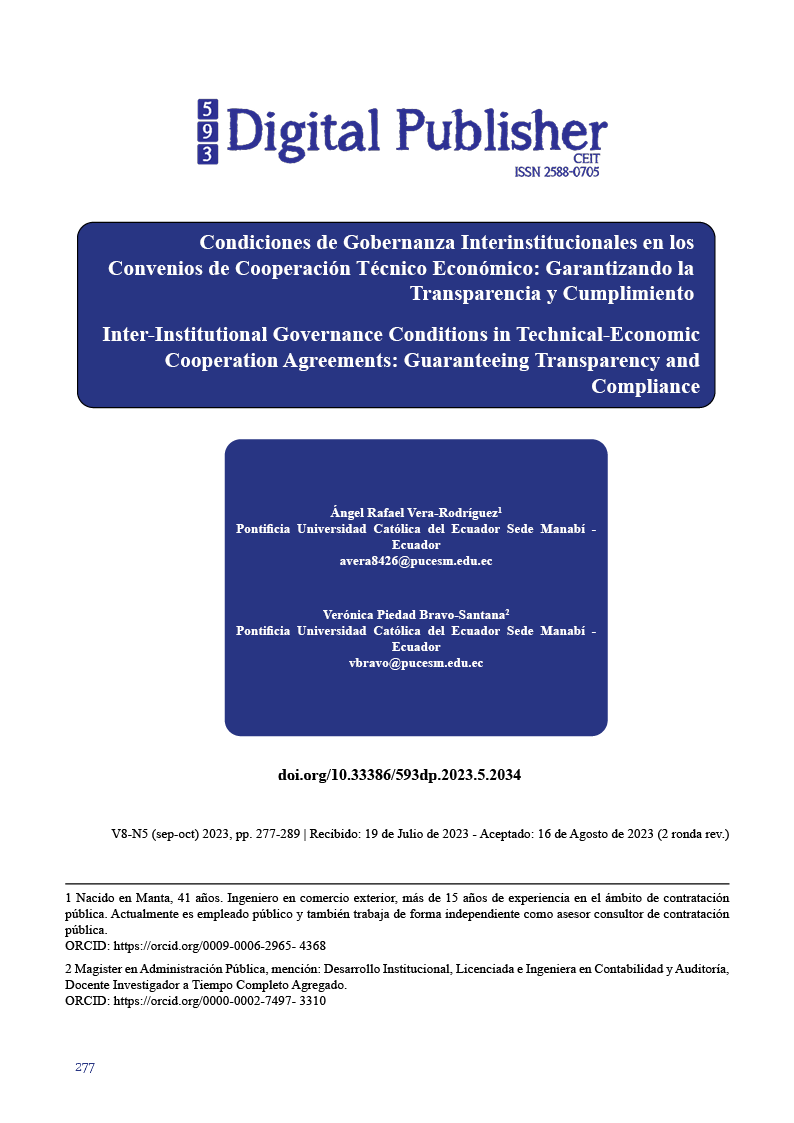Inter-Institutional Governance Conditions in Technical-Economic Cooperation Agreements: Guaranteeing Transparency and Compliance.
Main Article Content
Abstract
Properly managing technical-economic cooperation agreements is a challenge, which is given by the transparency of the processes and the fulfillment of the objectives. However, it has been notorious that the governance conditions in this type of agreements do not respond to the problems that concern them, where communication is scarce and not very assertive. The present investigation had as objective those competent governance conditions that guarantee efficiency and quality in the provision of services, in addition to identifying the problems derived from ambiguities and seeking alternatives for its improvement, to create structures that are functional and avoid disagreements in the conventions. The research was carried out from the qualitative perspective, which allowed revealing quality information through the interviews. A non-experimental approach was used, and a cross-sectional temporality was used for the study. The sampling design was based on convenience, where a structured interview was applied to the legal representatives of both entities and a caregiver of a CDI, which was analyzed using the Straus and Corbin grounded theory model, resulting in a suitable technique. for the interpretation of information and the use of the MAXQDA software. As a result, 3 categories were obtained that represented significant problems between the entities. A COSO model was finalized with the proposal to reduce institutional deficiencies, corruption, and conflicts of interest, as well as the improvement of evaluation and liquidation processes, transparency, ethics, and good practices in agreements.
Downloads
Article Details

This work is licensed under a Creative Commons Attribution-NonCommercial-ShareAlike 4.0 International License.
1. Derechos de autor
Las obras que se publican en 593 Digital Publisher CEIT están sujetas a los siguientes términos:
1.1. 593 Digital Publisher CEIT, conserva los derechos patrimoniales (copyright) de las obras publicadas, favorece y permite la reutilización de las mismas bajo la licencia Licencia Creative Commons 4.0 de Reconocimiento-NoComercial-CompartirIgual 4.0, por lo cual se pueden copiar, usar, difundir, transmitir y exponer públicamente, siempre que:
1.1.a. Se cite la autoría y fuente original de su publicación (revista, editorial, URL).
1.1.b. No se usen para fines comerciales u onerosos.
1.1.c. Se mencione la existencia y especificaciones de esta licencia de uso.
References
Calderón Hoffmann, A., Dini, M., & Stumpo, G. (2016). Los desafíos del Ecuador para el cambio estructural con inclusión social. https://repositorio.cepal.org/bitstream/handle/11362/40863/S1601309_es.pdf?sequence=1&isAllowed=y
García, J. D. D., Carrizo, R., & Mena, T. (2019). El control interno como herramienta para la prevención del fraude. Revista FAECO sapiens, 2(2), 111-117. http://portal.amelica.org/ameli/journal/221/221970026/html/
Gilli, J. J. (2017). La transparencia como objetivo del desarrollo sostenible. Ciencias Administrativas, (9), 43-49. https://www.redalyc.org/journal/5116/511653847004/html/
Glaser, B. G. & Strauss, A. L. (1967). The discovery of grounded theory: strategies for qualitative research. Hawthorne, N.Y.: Aldine de Gruyter.
Grau, N. C. (2006). La transparencia en la gestión pública: ¿Cómo construirle viabilidad? Estado, gobierno, gestión pública: Revista Chilena de Administración Pública, (8), 22-44.
Hernández, D. L., Bonilla, M. D. R. T., Aranda, L. B., & Hernández, M. D. L. L. L. (2014). Los convenios como herramienta para fomentar el desarrollo institucional en materia de investigación en salud. Revista de Especialidades Médico-Quirúrgicas, 19(2), 216-221.
Herrera, Á. A. M., & Porras, F. M. A. (2022). Importancia de aplicar controles internos en la administración pública, para salvaguardar el recurso público del Estado. Recimundo, 6(4), 516-524. Doi: 10.26820/recimundo/6. (4). octubre.2022.516-524
Kooiman, J. (2003) Gobernar en gobernanza. SAGE Publications Ltd. https://webs.ucm.es/centros/cont/descargas/documento24211.pdf
La Rosa Rodríguez, E. (2011). Los conflictos de intereses. Acta bioethica, 17(1), 47-54. https://www.scielo.cl/scielo.php?script=sci_arttext&pid=S1726-569X2011000100006
Ministerio de Inclusión Económica y Social (2013) “Servicios y programas.” https://www.inclusion.gob.ec/wp-content/uploads/downloads/2013/06/folleto-servicios-del-mies.pdf
Montalván, R. A. A., & Mozo, H. P. B. (2021). La transparencia en la administración de los recursos públicos. Ciencia Latina Revista Científica Multidisciplinar, 5(4), 5526-5539. https://ciencialatina.org/index.php/cienciala/article/view/705/974
McAfee, R. P. (2010). Transparencia y políticas antimonopólicas. El trimestre económico, 77(306), 257-272. https://www.redalyc.org/articulo.oa?id=31340963008
Navarro Olea, D. (2020). Gobierno abierto: transparencia y acceso a la información en la administración de los recursos materiales. Biolex, 12(22), 169-182. https://doi.org/10.36796/biolex.v22i0.172
Peschard, J. (2005). Transparencia y partidos políticos. México: IFAI. http://www.resi.org.mx/icainew_f/images/Biblioteca/Cuaderno%20transparencia/cuadernillo8.pdf
Ponce Leiva, J. (2005). Las relaciones Ecuador-Estados Unidos en 25 años de democracia (1979-2004). https://digitalrepository.unm.edu/cgi/viewcontent.cgi?article=1368&context=abya_yala
Quintero Castellanos, C. E. (2017). Gobernanza y teoría de las organizaciones. Perfiles latinoamericanos, 25(50), 39-57. https://www.redalyc.org/pdf/115/11553201014.pdf
Quintero Castellanos, C. E. (2017). Gobernanza y teoría de las organizaciones. Perfiles latinoamericanos, 25(50), 39-57. Doi: 10.18504/pl2550-003-2017
Ratto, C. D. (2005). Reflexiones generales en torno al problema de la Interpretación de los Convenios para evitar la Doble Imposición Internacional. Derecho & Sociedad, (24), 48-60.
Restrepo, D. (2013). La Teoría Fundamentada como metodología para la integración del análisis procesual y estructural en la investigación de las Representaciones Sociales. CES psicología, 6(1), 122-133. https://www.redalyc.org/pdf/4235/423539419008.pdf
Rivera, A. B., Rojas, L. R., Ramírez, F., & de Fernández, T. Á. (2005). La comunicación como herramienta de gestión organizacional. Negotium, 1(2), 32-48. https://www.redalyc.org/pdf/782/78212103.pdf
Rodríguez-López, G. R. (2021). Control interno y la prevención del fraude. Journal of business and entrepreneurial studie.
Rojas, L., Y Arapé, E. (1995). “Comunicación y Empresa: Hacia una Teoría del Postmanagement”. En Revista de Ciencias Sociales. Vol. 1 N° 2. Maracaibo, Venezuela.
Strauss, A. L. & Corbin, J. (2002). Bases de la investigación cualitativa: técnicas y procedimientos para desarrollar la teoría fundada (1. ed.). Medellín: Editorial Universidad de Antioquia.
Strauss, A. L. (1990). Qualitative Analysis for Social Scientists. New York: Cambridge University Press
UNICEF (2019). “La mala alimentación perjudica la salud de los niños en todo el mundo, advierte UNICEF”. https://www.unicef.org/es/comunicados-prensa/la-mala-alimentaci%C3%B3n-perjudica-la-salud-de-los-ni%C3%B1os-en-todo-el-mundo-advierte
Uvalle Berrones, R. (2008). Gobernabilidad, transparencia y reconstrucción del Estado. Revista Mexicana de Ciencias Políticas y Sociales, 50(203), 97-116. https://www.redalyc.org/articulo.oa?id=42120305
Vegas Meléndez, H. (2013). Investigación cualitativa para el abordaje de la gestión pública local. Observatorio Laboral Revista Venezolana, 6(11), 79-95. https://www.redalyc.org/pdf/2190/219030140006.pdf
Vielma López, C. O. (2022). Gobernanza y colaboración inter-institucional en salud a partir de la gestión territorial: caso de Unidad Información y Gestión Territorial de la Seremi de Salud Metropolitana. Tesis de Maestría. Universidad Alberto Hurtado.
Villanueva L. (2006). Gobernanza y gestión pública. Fondo de Cultura Económica, 438. https://marcelagonzalezduarte.files.wordpress.com/2018/01/aguilar-villanueva-gobernanza-y-gestion-publica.pdf
Zamora, W., Ponce, T. Y., Chávez, M. I., & Cedeño, I. M. (2018). El control interno y su influencia en la gestión administrativa del sector público. Dominio de las Ciencias, 4(4), 206-240. http://dominiodelasciencias.com/ojs/index.php/es/article/view/835



